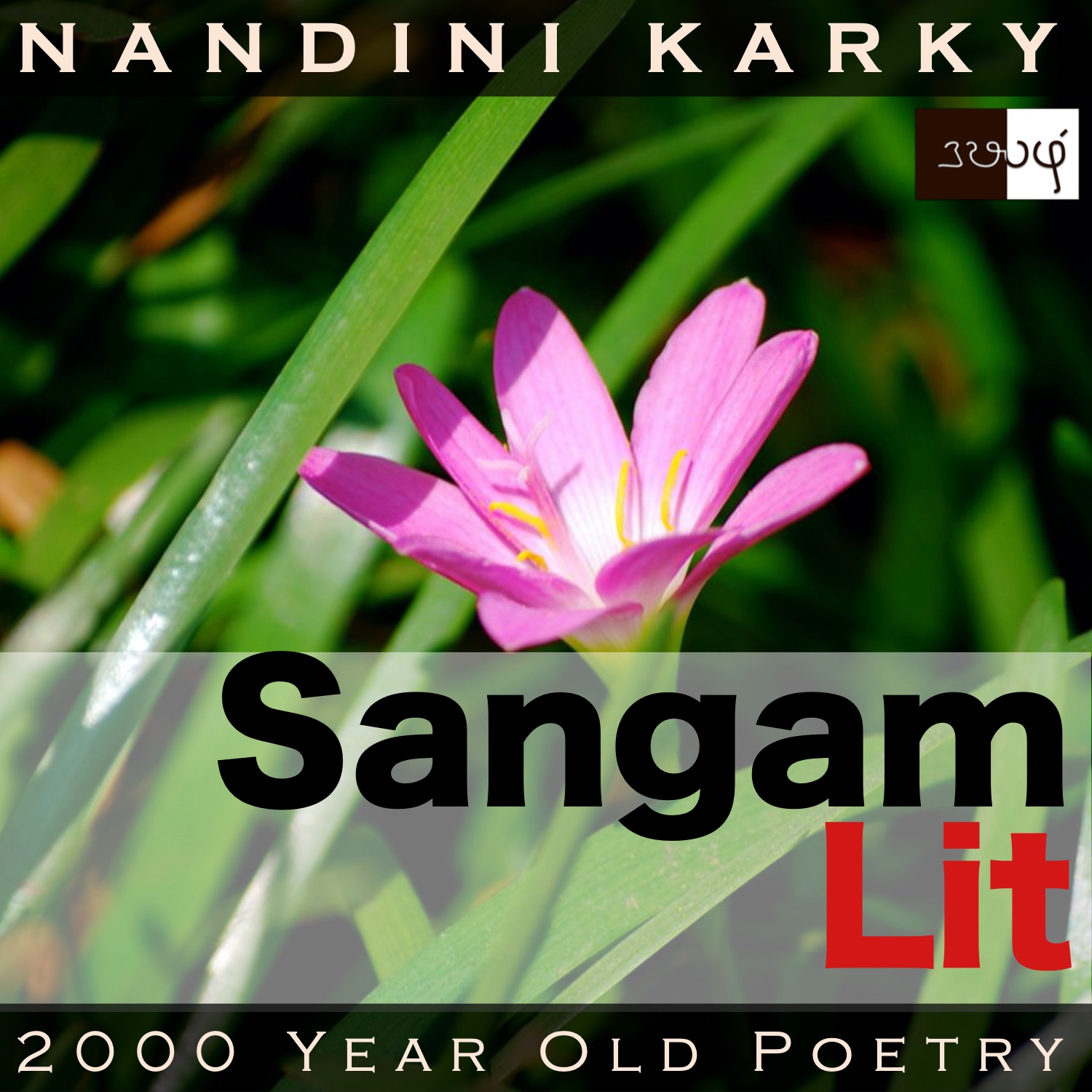Podcast: Play in new window | Download
Subscribe: Apple Podcasts | Spotify | Amazon Music | Android | iHeartRadio | TuneIn | RSS | More

In this episode, we delight in the description of an ancient city, as depicted in Sangam Literary work, Natrinai 190, written by an anonymous poet. Set in the ‘Kurinji’ landscape of mountain country, the verse speaks in the voice of a man to his heart, urging the confidante, listening nearby, to help him win the affection of the lady.
நோ, இனி; வாழிய-நெஞ்சே! மேவார்
ஆர் அரண் கடந்த மாரி வண் மகிழ்த்
திதலை எஃகின் சேந்தன் தந்தை,
தேம் கமழ் விரி தார் இயல் தேர் அழிசி,
வண்டு மூசு நெய்தல் நெல்லிடை மலரும்
அரியல் அம் கழனி ஆர்க்காடு அன்ன
காமர் பணைத் தோள் நலம், வீறு எய்திய
வலை மான் மழைக் கண் குறுமகள்
சில் மொழித் துவர் வாய் நகைக்கு மகிழ்ந்தோயே!
The moment I read ‘நோ, இனி’, I couldn’t help smile because it sounded to me like a Tanglish phrase meaning ‘Not anymore’, a Tamil youth of today would say. Tanglish, as you may know, is a combination of Tamil and English. However, Tamil is at its purest here and this means ‘Diseased, hereafter!’ Learnt a new word for ‘enemy’ in ‘மேவார்’. The two-word phrase ‘மாரி வண்’ paints the rich imagery of ‘generosity akin to a rain cloud’. Similarly, ‘திதலை எஃகின்’ concisely packs the image of ‘blood stained spears’, proclaiming someone’s bravery in battle. This someone turns out to be ‘சேந்தன்’, an ancient prince who lived in the Sangam era. We know he’s not king yet, for immediately follows mention of his ‘தந்தை’ or ‘father’, with the name ‘அழிசி’. The phrase ‘நெய்தல் நெல்லிடை மலரும்’ brings forth the lush imagery of ‘blue lotus flowers blooming amidst the green paddy’. The city that’s being described thus is ‘ஆர்க்காடு’, a place said to be situated on the banks of the River Cauvery in the Tanjore district and not to be confused with the current day ‘Arcot’ region of Tamilnadu. The poem ends with the description of a girl who has ‘rain-like eyes’ as in ‘மழைக் கண்’ and also, who happens to ‘speak little’ as in ‘சில் மொழி’. Let’s learn the meaning behind the words of this terse verse!
The man had met a lady and fallen in love with her. However, to win the affection of the lady, the man must seek the help of the lady’s confidante. This confidante tests the lady’s suitors in many ways to see if they are fit for her. The man, after repeated attempts, still finds no favour in the confidante. One day, seeing the confidante pass by, the man says to his heart, “He, who has captured many an impenetrable fortress of the enemy; who is generous like the rain clouds; who relishes the intoxication of toddy; who leads an army of spears stained by the blood of his foes; goes by the name ‘Sendhan’. His father, who wears honey-fragrant, wide-petaled garlands; who is the possessor of swaying chariots many; goes by the name ‘Azhisi’. In his city ‘arcaud’, bee-swarming blue lotus flowers bloom amidst the paddy in those intoxicating fields. Her desirable, bamboo-like, thick shoulders are akin to that city of ‘arcaud’; Her rain-like eyes are enchanting like those of a deer caught in a net. That young girl speaks but words few with her red lips. Long may you live, o heart! Henceforth, you will suffer, for you have fallen for the smile from those lips!” With these words, the man describes the suffering his heart is about to face as he seems to make no headway in winning the lady’s affection and thus, subtly urges the confidante to help him there.
A song filled with a mountain of nuances! Right away, the man begins his statement to his heart in the tone of ‘Gone, you are!’ Then, he proceeds to tell us why. But he sure does take his time and doesn’t get there until the last line is said and done! The man talks about ‘impenetrable forts belonging to the enemy’ using the word ‘Mewar’ for ‘enemy’. Little does he know, there will arise an impenetrable fort in the city of ‘Mewar’, Rajasthan, centuries later! Talk of indomitable forts is to describe the bravery of ‘Senthan’, who seems to have won over many such forts and returned to his city with an army of blood-stained spears. Not only is Senthan brave, but he is generous and gives to others like a rain-bearing cloud. High praise and yet, the song is not about Senthan. Could it be about his father ‘Azhisi’, said to be the owner of speedy chariots and the wearer of fragrant garlands. And yet, the song is not about King Azhisi too. The man then talks about the bee-buzzing, blue lotus flowers, blooming in a bed of paddy, to describe the pretty fields of this king’s city, ‘arcaud’. So, is the song about the city of ‘arcaud’? Patience, dear listener! The man is almost there. ‘Arcaud’ is called in only as a description of the lady’s bamboo-like shoulders. The man then waxes poetic about her moist eyes akin to that of doe caught in a net, her words so few and her lips so red. Then he explains he’s destined to suffer because he has fallen for the smile from the lips of that illustrious lady!
From a prince to his father to their city, the man finally arrives at his destination, the lady of his heart. As in Natrinai poems 35 and 39, here too appears, the fascinating Sangam tradition of using a city as a simile for a lady’s beauty. What exquisite cities the Sangam people must have lived in! Here’s a challenge inspired by this Sangam tradition – Could you describe a man or a woman with a facet of the city you live in, now? The more important question is, would it be a still be a compliment? I leave you to discover the poet in you!




Share your thoughts...